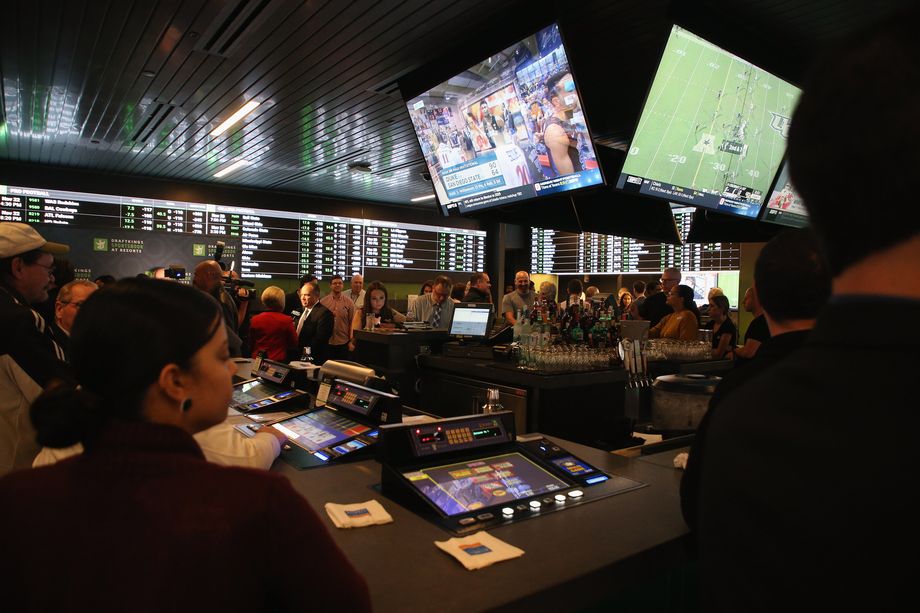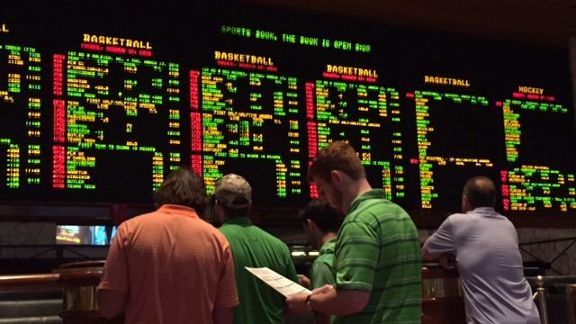If you’re looking for some true degenerates, may I present 217 sports bettors in New Jersey!
The state’s Department of Gaming fined sports betting operator The Stars Group (TSG) $10,000 after they violated the state’s prohibition of betting on colleges and universities that reside in New Jersey.
And who did these bettors wager on? Rutgers and Monmouth men’s basketball — arguably the most embarrassing major program in history, and a program that finished the 2018-19 season ranked 295th out of 353 teams in Ken Pomeroy’s ratings. When you have a host of other college basketball games on which to wager, you’re either alumni or desperate for a fix to want to keep an eye on those two teams.
Ten months ago, New Jersey became the third state in the country to legalize sports betting following Nevada and Delaware. Since then, five more states have legalized and implemented sports betting, and four more states have passed legislation.
New Jersey differs from the other 11 states in that it has explicitly prohibited sports betting on universities that are in the state. You can wager on virtually any sporting event out there, but if you bet on it in New Jersey, you cannot bet on Rutgers, Seton Hall, Farleigh Dickinson, Monmouth, or Princeton.
The Stars Group was fined after taking 216 bets on a Nov. 19 matchup between Rutgers and Eastern Michigan and a single bet on a Dec. 31 matchup between Monmouth and Penn. The company claims it was a “manual gating error.”
In case you’re wondering, Rutgers beat Eastern Michigan, 63-36, to cover a seven-point spread and Monmouth won, 76-74, to win outright as a 13-point underdog.
Prohibiting betting on in-state colleges ignores the realities of bookies and the internet, and will cost the state money
Sports betting has existed in the black market for over 100 years. Nevada formally legalized it in 1949, but otherwise it remained illegal in the rest of the country until the United States Supreme Court overturned the Professional and Amateur Sports Protection Act. PASPA prohibited states from legalizing sports betting (Nevada was fully grandfathered in), and the court ruled that it violated the anti-commandeering doctrine in the 10th Amendment.
States have begun legalizing sports betting, with as many as 30 states considering legislation this year. This has started to bring sports betting into the light of regulation and taxation. When sports betting is illegal, people will find ways to wager on it. If it is illegal all around them, they will find a bookie or an offshore online sportsbook.
For New Jersey residents, they can easily go to Pennsylvania or Delaware — and in the near future, into New York — to place their wagers. That takes taxable revenue off the table for New Jersey and either gives it to neighboring states, or removes it entirely since nobody is paying taxes on bets placed offshore or with bookies.
More importantly, it does nothing to protect the integrity of their student-athletes. College basketball has had its share of point-shaving scandals and they have involved illegal bookies — not legal casinos. Former New Jersey governor Chris Christie told me he thinks it sends a message to student-athletes about staying away from gambling.
“I think it sends the right message to the students in your state, too — the student-athletes in your state, that you’re not allowing that betting, that reinforces the idea that they shouldn’t be in any way involved with the gambling business while they’re student-athletes.”
This might influence a few student-athletes, but it’s monumentally naive to think it is the outcome of this kind of prohibition. Maybe it keeps a few kids out of casinos, but legislators can only stick their head in the sand for so long.
Christie thinks few people will want to bet on New Jersey schools — he’s wrong
New Jersey college sports has had some success over the years. In men’s basketball, Seton Hall has been to four straight NCAA tournaments and was a force in the late ‘80s and early ‘90s, Princeton is regularly competitive in the Ivy League, and Farleigh Dickinson is competitive in the Northeast Conference.
And yet, this recent discipline proves it doesn’t matter if a team is any good — people are going to bet on them regardless. Rutgers-Eastern Michigan is almost never going to be a marque matchup, and it still got 216 people willing to bet on it. That’s one game that most of the basketball world has little interest in. People in New Jersey may realize many of their colleges stink at sports, but that won’t stop them from wagering on them if allowed. Some will choose to profit off their poor play, while others will get sucked in by the emotion of a school they’ve followed for years. Either way, New Jersey would profit.
In other states, this could prove to be a bigger problem
Sports betting legalization is still in the early stages, and New Jersey is currently the only state that prohibits betting on in-state college sports. However, Kentucky is considering legislation with a similar prohibition against betting on colleges within the commonwealth. That would mean you could bet on contests involving neighboring schools like Ohio State or Indiana or Tennessee, but you could not bet on Kentucky or Louisville.
Rutgers and Monmouth may be bad sports schools, but Kentucky and Louisville are decidedly not. Prohibiting wagering on Kentucky and Louisville does little to protect student-athletes. If you can go to one of a host of other states to bet, or you can find a bookie or offshore sportsbook, the betting is still going to happen.
The answer is full-scale legalization
Seven of the eight states with legal sports betting allow for betting on colleges within their borders. It will decrease the black market and provide states with additional tax revenue. Furthermore, it will bring them into the light of regulation. If there is shady betting on a Rutgers basketball game, the casinos and the gaming board will be able to track it. Customers will be able to bet with confidence knowing everything is on the up-and-up.
It might take time, but eventually New Jersey needs to adopt this approach. Christie talked about wanting the state to be a leader in sports betting, and this is one way to do it. Acknowledge the folly of a college sports betting prohibition and bring it fully into the light.
Currently 30 states are considering legislation to legalize sports betting, and there are likely more to come. Iowa is closing in on legalization, with legislation headed to the governor for a signature, and it will allow betting on Iowa and Iowa State. It’s only logical, and hopefully more states will follow their lead.






